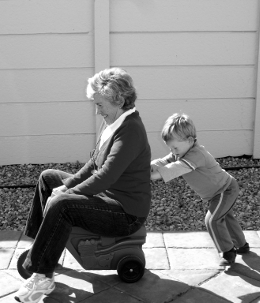New scheme links oldest and youngest
 A new initiative is bringing together our oldest and youngest generations.
A new initiative is bringing together our oldest and youngest generations.
The ‘Child Care in Aged Care’ project is an intergenerational program that aims to deliver significant health and wellbeing benefits for older people and preschool children both.
The innovative intergenerational education and development program will connect children with older people in a structured way.
Announced as part of a South Australian government plan to support all South Australians to age well, the project will promote meaningful community connections and challenge ageism by linking generations and challenging stereotypes.
“Intergenerational activities have so many benefits for all participants, but they’re particularly good for creating genuine opportunities that encourage social connectedness,” Dr Murray says.
“When we bring together older people and preschool-aged children, we find that there is a real sense of joy. Everyone is focussed, everyone is in the moment, and as a result, everyone benefits.”
Current statistics show that South Australia has the highest proportion of older people on mainland Australia with more than 37 per cent of South Australians aged over 50 years.
The Child Care in Aged Care project is still in the development phase, but it hopes to enhance connections between different sectors (community, government, aged care, child care and university) to tackle ageism and grow diversity.
Aged care provider ACH Group spokesperson Ms Ivy Diegmann says the program will focus on promoting valued roles of older people.
“Older South Australians are diverse, with different ideas, aspirations and lived experiences, which – when shared – can enrich the lives of younger generations,” Ms Diegmann says.
“Creating and maintaining social connections are key to ageing well, but far too often, they fall by the wayside.
“Through the Child Care in Aged Care project, we’re creating opportunities to connect and create meaningful engagement across generations and community, to ensure a sense of vitality, inclusivity and self-worth for everyone involved.”
The pilot is expected to commence in 2021.








 Print
Print